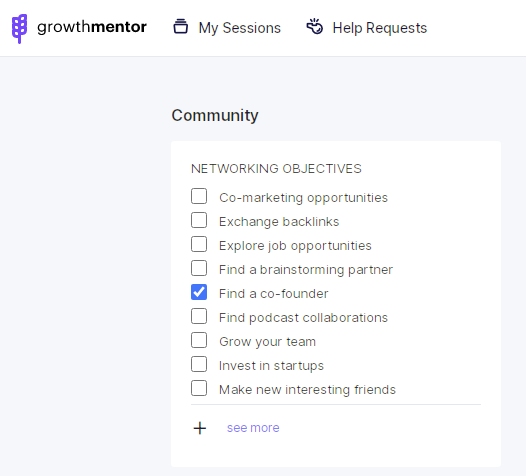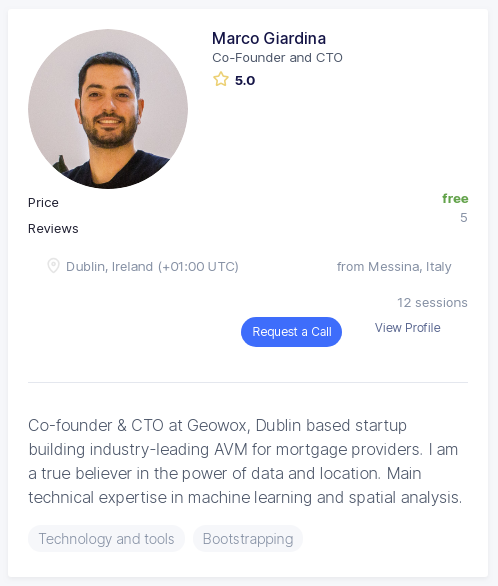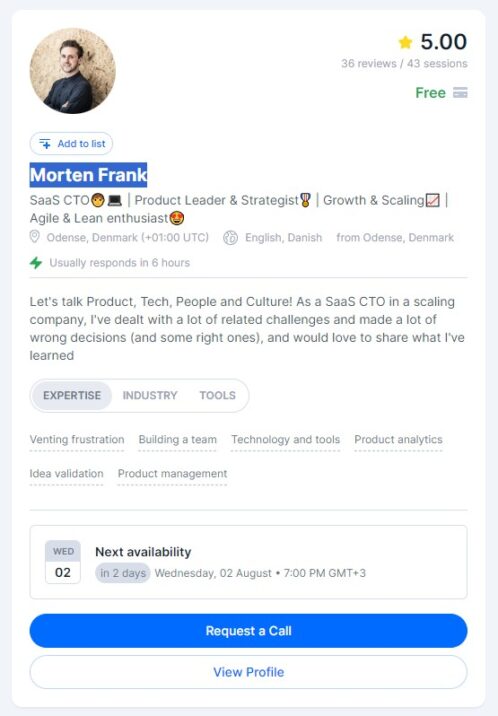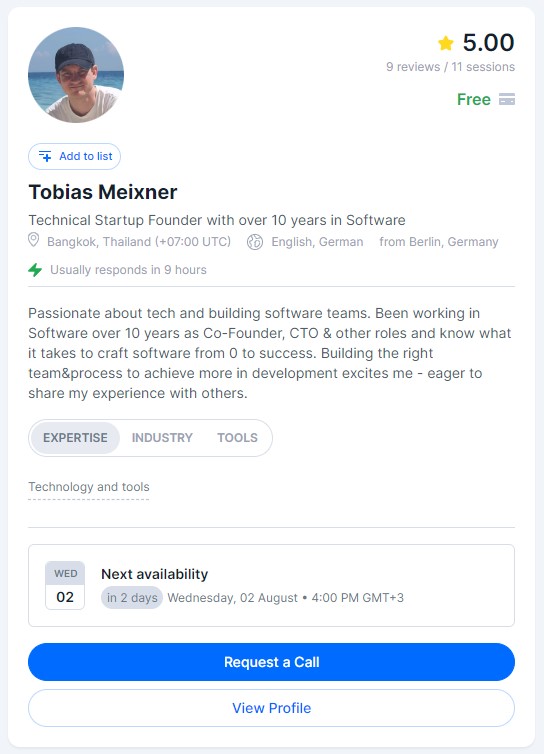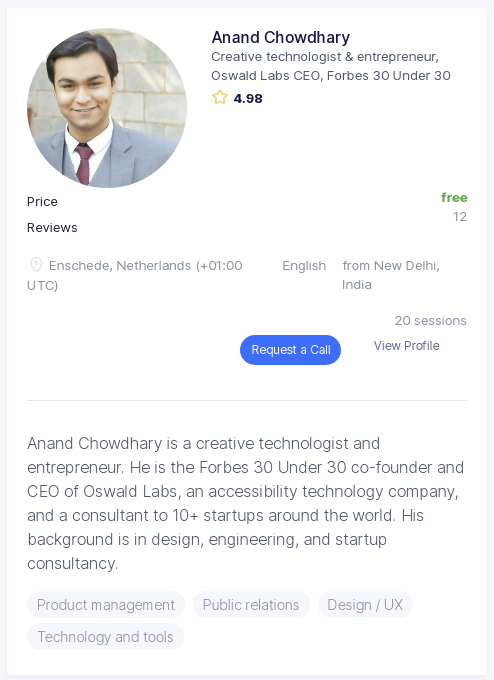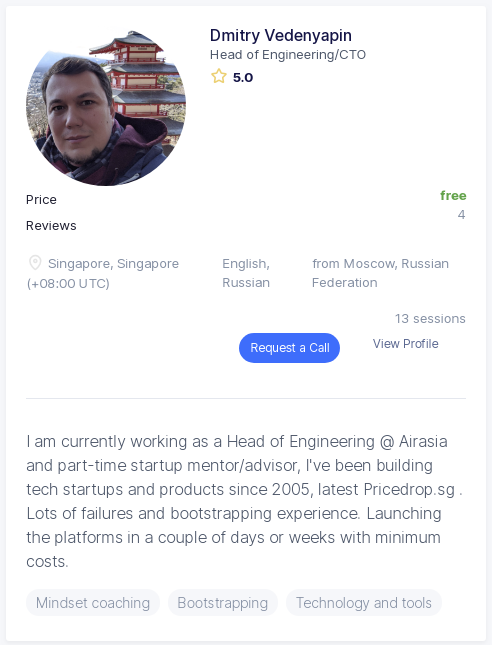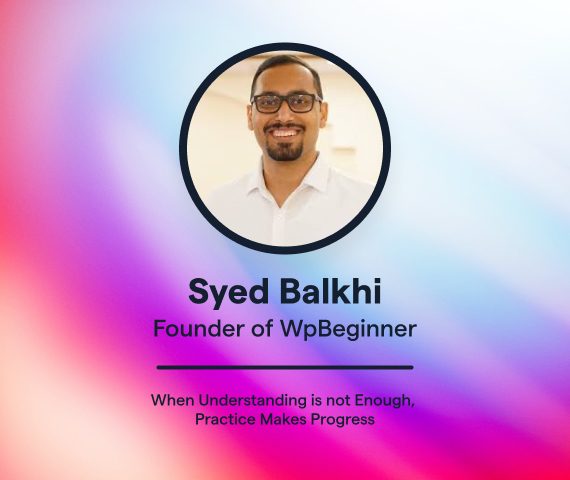You Need a Technical Co-Founder: Here’s How to Find One
- 1.You Need a Marketing Co-Founder: Here’s How to Find One
- 2.6 Most Popular Websites to Find a Co-founder for Your Startup
- 3.You Need a Technical Co-Founder: Here’s How to Find One
Over the last few years, there’s been a huge rise in the number of “no code” tools, making it easier than ever before for non-technical founders to build a business.
The barrier to entry has been lowered, and it’s a game-changer.
It’s comparable to the growth in easy-to-use website platforms. Back in the day, if you wanted to build a website, you needed at least a rudimentary understanding of HTML along with the know-how needed to upload your files to a web server. Then platforms like WordPress and visual drag and drop editors like Squarespace came along. Suddenly, anyone could build a simple website.
But these “no code” tools still have their limitations.
So while it’s easier for non-technical founders to create prototypes, they still need help when it comes to the final product.
You’ll rarely find a unicorn that started without a strong technical co-founder.
What is a technical co-founder?
But what exactly is a technical co-founder?
When we talk about co-founders, we’re talking about the founding members of your team when you first set out to build your business. There are two different types of co-founder: technical and non-technical.
Technical co-founders are those who bring specific hard technical skills to the table, like PHP development or systems administration. They’ll be able to put their technical ability to good use to build your product and to help it to scale in the early days.
Later on, when you’re ready to start growing your team and taking on new employees, they can also help you to find other talented technical specialists. If you’re trying to take on Amazon with a new ecommerce platform, for example, then you’re going to need dozens – if not hundreds – of developers on your team.
Non-technical co-founders might not be able to help with the creation of web platforms and digital assets, but that doesn’t mean that you should discount them.
Let’s say that you’re the founder and you have industry experience and a great idea. You might want to take on a technical co-founder to help you to turn your idea into a reality, but you also might want to work with another non-technical co-founder who has fundraising experience and a reputation for guiding startups through Series A rounds and on to the stock exchange.
Just bear in mind that the more co-founders you work with, the more equity you’re going to have to give up. We’ll take a closer look at that a little later on.
Why you need a technical co-founder
There are three main reasons why you might want to work with a technical co-founder:
1. When you can’t create your product without one
In this case, you don’t have much of a choice. Without a technical co-founder, you’ll have no way of taking your idea from concept to execution.
2. When you’ve created a proof-of-concept but need to develop and scale
As we’ve already discussed, it’s sometimes possible for a non-technical entrepreneur to build a proof of concept or to use a “no code” platform to get an early version up and running. When that’s the case, it can be useful to take on a technical co-founder to help you to take that proof of concept and to turn it into something that’s ready to go global.
3. When you don’t want to manage freelancers or agencies
Non-technical founders always have the option of simply hiring freelancers or agencies to turn their vision into a reality. The problem is that managing these external resources can take a lot of time, and many entrepreneurs simply don’t have the time to spare. There’s also the problem that these temporary workers are simply executing upon a brief, and they’re not necessarily passionate about the project or 100% bought into the company’s vision.
Why you don’t need a technical co-founder
There are plenty of reasons why taking on a technical co-founder might not be right for you. The most common reasons for this are:
1. When you have the technical side covered
If you’re one of those rare few founders who have both technical expertise and the vision and the hustle required to build the business yourself, you might not need to take on additional technical expertise to see you through.
2. When you can tap into the gig economy
If you don’t mind the extra elbow grease that you’ll need to put in to manage external resources, you might be able to rely on freelancers or agencies to get the job done. But as we’ve discussed, this also comes with its fair share of drawbacks.
How to recruit talented tech co-founders
I wish there was a simple trick or a golden bullet that I could share that would help you to recruit top talent, but there isn’t. Luck goes a long way, and it can also help to have an extensive professional network so that you can ask for referrals.
It’s a competitive marketplace, and it’s difficult to attract top talent due to the high number of startups that are willing to pay salaries way above the industry standard. The most successful startups are greater than the sum of their parts, and they manage that by going above and beyond to attract skilled candidates that are passionate and team players.
Then there’s the fact that working for a startup tends to offer less job security than working for a more established company. When people are deciding whether to join you, they’ll use a simple opportunity cost decision framework. You need to be able to offer enough value to make the risk worthwhile.
Ask yourself, “Why should they risk a stable, six-figure-per-year income to join your startup? If you can find a compelling reason why they’d do that, you’ve already half-won the battle. Then you just need to communicate that reason to the right people.
How to communicate with technical people if you’re non-technical
Finding the right technical co-founder is difficult, but it can be even trickier to communicate your vision with them and to understand what they mean when they start talking about MySQL and data science.
Part of the reason for taking on a technical co-founder is so that they can worry about all of the geeky stuff on your behalf. With that said, you should never pass up an opportunity to learn new skills, and it’s a good idea to get a handle on the basics.
Ten years ago, non-technical entrepreneurs were struggling to get to grips with the basics of SEO and digital marketing. Today, they need to understand machine learning, the internet of things and natural language processing.
The key here is to meet them halfway. You need to communicate the non-technical bits like your vision and the route you plan to take towards market domination, and they need to communicate the basics of their technical field and how that relates back towards your business goals.
The key here is in the title: communication.
You don’t need to share every little detail, but you do need to both explain what you’re doing and why you’re doing it. Otherwise, you’ll end up working at cross-purposes and pulling the company apart due to your different ideas of where it’s heading.
What engineers are looking for when joining
When you’re looking to recruit technical staff, you need to speak their language from the outset. You’ll struggle to bring people on side with just a dream, and so you need to know what engineers look for and then use that to create a compelling offer.
There are five main factors that can influence tech specialists when they’re considering working for a startup:
1. Equity: When we talk about equity, we’re talking about the share of your company that you offer to people in exchange for them joining you. Some startups offer equity to all employees, while some just offer equity to founding members.
2. Salary: We all need to put food on the table, and while equity can pay off later on once the company picks up value and hopefully goes public, it’s a waiting game. The salary that you offer will need to be enough to cover their living costs in the meantime.
3. Culture: 88% of jobseekers say that company culture is important to them, and yet 64% of all employees don’t feel that they have a strong work culture. This means that if you develop a strong company culture, you’re already doing better than two thirds of your competitors.
4. Values: Values and company culture are related but not identical. The culture could be that it’s easy-going or that there’s a strong social component. Values are the reason why the company exists, such as to combat poverty or to streamline the supply chain.
5. Personal Growth: Everyone wants the opportunity to experience personal and professional growth in the workplace. If you’re able to offer ample opportunities for growth, it can offset a low salary.
How much equity should you give?
This is one of those “how long is a piece of string” questions. It’s also something that you’ll need to negotiate with any co-founder that you take on, so it’s worth setting yourself a rough limit and then sounding out the co-founder for what they expect before you make an offer.
Some co-founders will ask purely for a salary and won’t ask for equity, but it’s a good idea to avoid deals like that because it can be a sign that they’re not fully onboard with the company and its vision. On top of that, when they have equity in the company, they have a vested financial interest in making the company succeed.
Other than that, it can help to see how much equity other, similar startups offered to their co-founders.
• Evan Spiegel and Robert Murphy owned 37% of Snapchat when it went public.
• Mark Zuckerberg owned 21% of Facebook at its IPO.
• Google’s Sergey Brin and Larry Page owned 31% of Google when that went public.
• Netflix’s Reed Hastings owned 24% of Netflix when that hit the stock market.
• Itay Forer offered his mentor Ran Grushkowsky 20% equity in his company even though Grushkowsky wasn’t actually a member of the team. Instead, Grushkowsky helped with fundraising and single-handedly boosted the early valuation of the company from $800,000 to $12 million.
• One study found that of 71 public tech companies, there were typically two founders owning a combined 15% of the company at the time of the IPO, equating to 7.5% equity per founder. At four of the companies, the founders no longer held any equity at all.
Where to find a technical co-founder
1. GrowthMentor
GrowthMentor is the world’s leading mentorship community, allowing startup founders and entrepreneurs to find professional mentors to provide expert advice on a range of subjects, from growth hacking to networking and investment.
One of the more interesting features of GrowthMentor is that it has a particularly useful option for finding a co-founder. Make sure that you tick the “find a co-founder” option when you first sign up so that you increase your chances of finding a mentor who can serve as – or refer you to – a technical co-founder.
With GrowthMentor, you can use these filtering options specifically to look for other founders who are looking for co-founders and to set up a consultation with them. You can then message them through the GrowthMentor platform and set up a Zoom call to get the ball rolling.
2. Through your professional network
This is probably the most obvious place to turn, but it’s also one of the least likely ways to guarantee success. Everyone has a professional network, whether they’re using LinkedIn or not. The key here is to work on a compelling offer that will give people a good reason to want to join you and then to make people aware of that offer.
You can reach out to your business contacts and ask them to help spread the word, and you can also reach out to people directly. If you have a LinkedIn account, you can use its powerful search capabilities to look for second and third degree connections who have the right kind of experience.
The downside to this approach is that you’re going to need a little bit of luck. You’ll have to hope that you’re able to reach the right people with the right message at the right time, with the timing being the most important factor. It’ll do you no good if you reach the right person but they’re not ready to take on a new challenge… which brings us on to the next point.
3. Furloughed lists
One of the best ways to reach people who are ready to take on a new project is to look at lists of employees who’ve been furloughed or laid off completely due to the coronavirus pandemic. It’s a little cheeky, because in a way you’re capitalizing on the unfortunate circumstances in which many people have found themselves, but you’re also offering some value and potentially helping them to take a negative and to turn it into a positive.
This tool – located at http://layoffs.fyi/tracker – will allow you to identify people who used to work at high growth tech startups. This means that they’ve already effectively been vetted by proxy and so you know that they’re capable of and available to take on their next big challenge. Reach out to them directly and pitch your idea.
4. Online Communities
The good thing about online communities is that they can provide you with a pre-existing audience of business professionals to tap into. They’re also on the rise due to COVID-19, because the lack of events and conferences has pushed people online to look for alternatives.
GrowthMentor, which we’ve already talked about, is the perfect example of a pre-existing community, but there are many more for you to think about, including:
- Indiehackers: This site is a bit like Reddit but for programmers and coders. It advertises a range of both online and in-person meetups and is a great place to start your search when you’re looking specifically for tech talent.
- Slack: Slack is to entrepreneurs what Discord is to gamers and content creators. If you’re able to find the right Slack groups, you’ll have access to real-time instant messaging with like-minded professionals around a common subject matter. You can view a list of slack groups for mentors and entrepreneurs here.
- CoFoundersLab: This site is specifically designed to connect entrepreneurs and founders. It boasts over 400,000 entrepreneurs and uses an AI algorithm to match you up with the people who are most likely to be of interest.
- Founders’ Nation: This platform allows entrepreneurs to create profiles that list their skills, occupation, location and bio. They can then take a look at each other’s profiles and access contact details to take the conversation further.
- AngelList: This platform is essentially a database of tools for startups and angel investors, which makes it the perfect place to look for co-founders and to start building your reputation before you go through a Series A. Over 100,000 startups are already using the site, so why wait?
Checklist of what to look for
The Good
- Willingness to take equity: If a potential co-founder is keen to take equity in the company, it’s a sign that they believe in its mission and think that the concept itself has legs.
- Previous experience: There’s no point hiring someone if they have no relevant experience in your industry, especially if you’re looking to hire because you yourself don’t have sufficient experience.
- Enthusiasm: Every founding member of your team needs a natural enthusiasm for the work that they’re doing and the mission that they’re undertaking. The more enthusiastic they are, the better.
- Technical expertise: When you’re hiring a technical co-founder, you need to know that they’re at the top of their game and that they have particularly strong skills at whatever their technical specialism is.
- Communication skills: Technical specialists need solid communication skills if you’re hoping for them to eventually lead a team and to report back to non-technical staff.
- Culture fit: Potential co-founders need to be a good cultural fit and have a personality that compliments instead of clashing with the other core members.
The Bad
- Tenure at previous companies: The big warning sign is if a potential co-founder has only stayed at their previous roles for an average of less than eighteen months. This is a sign that they’re not going to stick around for long if they join your startup.
- Big egos: There’s an important balance to aim for here. You want your co-founders to have confidence in their own abilities, but if their egos are too big then there’s a risk that they won’t be team players or that they’ll make mistakes due to overconfidence.
- Lack of ambition: It can be tough to find the balance between ambition and a big ego, but your co-founders need to try. They need to believe that your startup can become a unicorn and have the ambition to see it through, but they also need enough humility to understand that success won’t just be handed to them on a plate.
- Lack of reputation: If you’re taking someone on as a technical co-founder, they should already have a reputation for excellence, even if that’s only when working for other people. If a candidate can’t provide testimonials from people they’ve worked for, it’s a sign that they’re not quite right for you.
- Unimpressive portfolios: In many ways, you want a technical co-founder whose work is so successful that you’ve already heard of them. Failing that, you need to find someone with a portfolio that’s so good that it blows your socks off. If you’re not impressed with their past work, you’re not going to be impressed by what they do for you.
- Dependent families: This one can sound a little harsh and it’s certainly no basis not to hire someone, but it can be a warning sign. Particularly in the early days, it’s likely that you’ll expect people to work long hours. If they’ve just had their first child or they have a spouse with health issues, the brutal truth is that they’re just not going to be able to commit that time to the company.
Don’t Rush!
Arguably the single most important tip of all is that you can’t rush these things. Most startups adopt the famous Silicon Valley “move fast and break things” mentality, but while that can work for some decisions, it’s disastrous for others.
When you’re searching for a technical co-founder, you’re making a long-term commitment. Unlike regular hiring decisions, you can’t just change your mind and flunk them at the end of their probation.
Choosing a technical co-founder is like choosing a marriage partner. You need to actually like each other, and you need to have a shared set of values and approach the world from a similar viewpoint.
If you don’t, bad things can happen. We’re talking about the professional equivalent of a messy divorce with a lengthy custody battle. Don’t believe me?
Garry Tan, managing partner at seed-stage VC firm Initialized Capital, believes that co-founder disputes are the number one reason why startups fail early, explaining:

Garry Tan - Former Partner at YcombinatorHere’s how it felt in the weeks before I resigned from my last startup: I couldn’t sleep. I couldn’t eat. Resting pulse at 120. I’d reached a point where I couldn’t agree with my co-founder over the future of the company. I had to step away from the startup for which I’d shed blood, sweat and tears. I didn’t want to do it, but I reached a point, physically and mentally, where I couldn’t handle the stress anymore
Tan has one further fascinating observation to share, which is that while a high amount of conflict can cause a startup to fail, the opposite can also be a problem. A certain amount of conflict is essential because it means that you’re tackling the difficult questions. If you and your co-founders never argue, it’s a sign that your team isn’t diverse enough, that people aren’t as passionate as they should be or simply that you’re surrounded by yes men.
Talk to a mentor
As we’ve already discussed, talking to a mentor can help you to make sense of the complex process of forming a founding team and even help you to get a better idea of what to look for.
As American entrepreneur, author and motivational speaker Jim Rohn famously said:

Jim Rohn - American entrepreneur, author and motivational speakerIt’s important to learn from your mistakes, but it’s BETTER to learn from other people’s mistakes, and it’s BEST to learn from other people’s successes. It accelerates your own success.
Mentorship, then, can help founders to stave off expensive mistakes and give them the benefit of a second pair of eyes, a new perspective and the hard-earned experiences of others. Here are just a few of the mentors that you might want to reach out to.
Featured mentors
1. Marco Giardina
Marco is the co-founder and CTO of Dublin-based Geowox, with experience working as a data scientist at banks, telecommunications, and marketing companies. He has a huge amount of knowledge when it comes to statistics, machine learning, and spatial analysis in particular.
Click here to view Marco’s profile on GrowthMentor.
2. Morten Frank
Morten is a CTO, and Software Engineer who’s based in Odense, Denmark. He has particular expertise in product vision, strategy, and roadmap, product management, creating scalable hyper-performing product and tech teams, validating an idea, and everything data related, amongst other things.
Click here to view Morten’s profile on GrowthMentor.
3. Tobias Meixner
Based in Bangkok, Thailand, Tobias is particularly experienced with Javascript and Jira and has a history of building efficient software teams and working with software engineering and e-commerce platforms, as well as solving real-world problems and helping customers achieve more, faster.
Click here to view Tobias’ profile on GrowthMentor.
4. Anand Chowdhary
Listed as one of Forbes’ 30 Under 30, Anand is a creative technologist and entrepreneur as well as the CEO of Oswald Labs. Originally from New Delhi, Anand now lives and works in the Netherlands and specializes in building products for people with disabilities.
Click here to view Anand’s profile on GrowthMentor.
5. Dmitry Vedanyapin
Dmitry is based in Singapore and is a head of engineering and CTO. For the last couple of years, he’s been working on high-load fintech builds, marketing technology, ecommerce platforms, user management, communications platforms and bootstrapping products that scale.
So what do you do?
Still looking for some technical expertise but don’t know where to turn?
Perhaps you want to take a look at some more mentors.
Whatever the case, we’ve got you covered. Head over to GrowthMentor today to browse our comprehensive list of mentors that are perfect for any founder who needs a helping hand making sense of finding a co founder.
